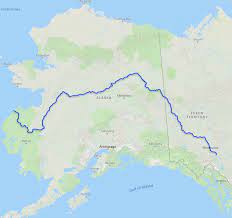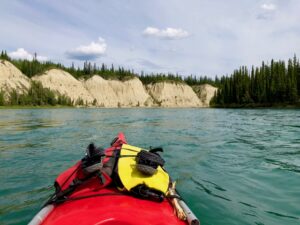The first word that comes to mind when I hear “meander” is “river.”
Specifically, “Yukon River.”
It is quite funny that I would say Yukon. I grew up in Kansas, over 3,000 miles from this iconic river of the North. The first river I remember is the “Cimarron”, a sometimes dry river bed – completely dry near where we lived in Ulysses.
The second is the “Kansas River” which runs near Manhattan, in North Central Kansas. We would cross this river often while visiting my Grandparents who lived on a farm a few miles from the river and the city. When he was a boy my Grandpa lived in a community so defined by that river it gained the name “Hunter’s Island” though it was not actually an island at all. He told me of waking in the night during flood conditions and hearing huge sections of river bank plunging into the surging waters.
And then there was the “Republican River” outside Clay Center where I lived as a High School boy. I once rafted with friends on this river.
But compared to the mighty Yukon these were mere waterways and drainages – or memories thereof in the case of the Cimarron. I remember seeing markers for the Cimarron as a boy but it is likely I was seeing it’s North Fork and I believe it was indeed completely dry. The Cimarron itself is all but 700 miles long. The Kansas and Republican together come to about 600 miles.

The Yukon?
Just under two thousand miles all by itself – about 715 of which traverse Canada.
From its Alaskan entry near Eagle to its Bering Sea delta near Alaknuk, the Yukon meanders, adding about 1300 miles of meander compared to a straight line distance from point to point. That is a lot of movement!
And so likewise my writing meanders. Observing passing thoughts while sitting among the ones that pertain, I remember that my late, beloved Uncle George once floated his canoe down the Yukon. I thought of him as I first observed the river from a school building in Nulato nearly 10 years ago. My guess is he took an air taxi to Eagle or perhaps Ft. Yukon and then floated / paddled his inflatable craft a few hundred miles down stream.

What must he have seen? The huge night sky for sure, with scarce visible stars due to the midnight sun. He was alone with only mosquitoes, the current, and various wildlife for company. I’m told he had bear protection around his tent at night, but I forget the nature of it. I’ll never get a first hand report as he has been gone for 17 years.
As I think of that trip and what it meant I wonder what life means and how we discover such meaning. Some say we create meaning. The canoe, the aloneness, the wildlife, the wander and wonder: it has no meaning of its own. Uncle George liked it: therefore, it meant something to him.
What is the problem here? I wish I knew. It seems the issue is something like this: we are desperate for meaning. To say otherwise via various artifices is, I think, a way of avoiding the desperation. But if we ourselves determine meaning, then meaning is hopelessly atomized. Divide the number of ears on the planet by 2 and you now have the total number of possible sets of meaning, each unique. But wait. Next you must add to that number the total number of people who ever lived before today.
(And that’s a rather numbing number: According to The National Institute of Corrections. 117 billion members of our species have ever been born on Earth.)
But meaning having meaning assigned in this way will simply not do and likely no serious philosopher would argue for it. I believe meaning comes from something fixed outside of us. This is necessary if only because meaning that is self-generated, in addition to the above objection, is unavoidably subjective. It will not bear the weight of our need. It only produces values that succumb to “self-referential incoherence.”
I believe true meaning is found only in a Creator God, and Augustine hints as much in his famous line: “God has made us for Himself and we never rest until we rest in Him.”
Those are my meanderings on this good day. I hope it gave you something meaningful to consider!

Randy Huff and his wife lived for 5 years in Roanoke (Hollins) where they raised 2 sons. Randy served as Dean of Students at a Christian school and then worked in construction. For the last 8 years he has served as pastor of a church in North Pole, Alaska.
